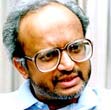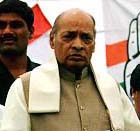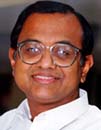M D
Nalapat 
 When I was about four or five, I realised India, till very
recently was a colony of another country. My grandfather, the
late V M Nar was the first to tell me, "Look, it is
a privilege you are born in free India. I have spent most of my
life in bondage." But at that age, the revelation did not
make much of a difference.
When I was about four or five, I realised India, till very
recently was a colony of another country. My grandfather, the
late V M Nar was the first to tell me, "Look, it is
a privilege you are born in free India. I have spent most of my
life in bondage." But at that age, the revelation did not
make much of a difference.
At about six or seven, I remember Japanese students in our school.
Japan at that time had lost the war, and was not a superpower.
those students came from a country, crushed and humiliated in
war, and I from a country that had won freedom.
In Kerala, the state from where I come, the looting done by the
British is very evident. Of the three regions -- Travancore, Cochin
and Malabar in Kerala, Malabar was under direct British rule.
Today, even in 1997, Malabar is more backward than Travancore-Cochin
in terms of literacy, status of women, industrial and agricultural
development.
I think, Kerala in microcosm shows very clearly the difference
between the enlightened Indian rule and the colonial rule of the
British. I am very conscious of the fact that the British were
here not for our interest but their own self interest.
Even though India became free, till very recently we have been
ruled by the British! We have been ruled by Indians of the European
mind-set. Except for the brief period of Lal Bahadur Shastri and
Morarji Desai, then Narasimha Rao and Deve Gowda, we were ruled
by the Nehru family. Those from the Nehru family are Europeans
in their mind-set, sociology and temperament.
Under the Nehrus, we had very high taxation and a lot of laws
which repressed India. The Communists that came to power in the
USSR adopted the habits of the Czar and became Communist Czars.
The Nehrus adopted the sociology of the British and continued
to suppress the Indians like the British.
 I must confess that in the early part of my development, I was
extremely radical in my understanding of politics. I waved the
red book of Chairman Mao, and thought of him as our chairman.
The homeless in Bombay put tremendous rage inside me, leading
to a totally wrong feeling that communism could be the answer
to all our problems.
I must confess that in the early part of my development, I was
extremely radical in my understanding of politics. I waved the
red book of Chairman Mao, and thought of him as our chairman.
The homeless in Bombay put tremendous rage inside me, leading
to a totally wrong feeling that communism could be the answer
to all our problems.
But I got out of that feeling after I saw more communists. I found
them very dogmatic. They were basically people for whom communism
was a crutch to come to power and comfortable life. In Kerala,
for example, the communists are extremely well off. I don't see
many communist families that allow their children to marry proletarians
or workers. Many even send their children abroad and live very
expensive lives.
When I saw all this, I began to feel that such an ideology would
not attract the right people, and was not an ideology I would
appreciate. In my mid-twenties, I moved away from communism, and
went into an individualist ideology which I have stuck to ever
since.
Communism tells us to look at the welfare of everybody. I feel
that it is a totally impossible, intellectual and impractical
concept.
In a communist society, you do not have individual excellence.
I must tell you, I am a little surprised at these communists who
are with the United Front government. In West Bengal, for example,
Jyoti Basu is begging for foreign capital. In Kerala, Nayanar
is going all over the world begging for industrial investment.
Obviously, the communist parties believe that capitalism is good
in Bengal and Kerala where they rule, but is bad anywhere else.
 A company was penalised by Indira Gandhi for having higher rates
of output from the rated capacity. So, that was the mind-set then,
achievement was wrong and success a crime. During Nehru's time,
the income tax rate went upto 97.75 per cent. T T Krishnamachari
had a budget, forty years before Chidambaram's excellent budget,
in which he charged 78 per cent income tax from Indians.
A company was penalised by Indira Gandhi for having higher rates
of output from the rated capacity. So, that was the mind-set then,
achievement was wrong and success a crime. During Nehru's time,
the income tax rate went upto 97.75 per cent. T T Krishnamachari
had a budget, forty years before Chidambaram's excellent budget,
in which he charged 78 per cent income tax from Indians.
You force people to be dishonest by this. Politicians didn't have
to worry about high taxes. Pranab Mukherji or Y B Chavan were
not bothered. For the first time, Indians are given tax rates
comparable to the tax rates of other civilised countries.
I would say Manmohan Singh is a highly over rated person. He gave
benefits to the foreigner in India. He continued to tax the Indian
very heavily. The benefits that we achieved from 1991 onwards
were because of some small internal liberalisation that took place
in our industrial policy, commerce policy, etc. It is not because
of Manmohan Singh's policy. Chidambaram, while benefiting the
foreigner is benefiting the Indian also.
 Only in our country do you put the foreigner first and Indians
last. It is the colonial mind-set of our rulers. Many of our civil
servants and others think like Europeans. To them, the Indian
is a horrible person to be beaten up, to be kept at bay and suppressed.
Only in our country do you put the foreigner first and Indians
last. It is the colonial mind-set of our rulers. Many of our civil
servants and others think like Europeans. To them, the Indian
is a horrible person to be beaten up, to be kept at bay and suppressed.
Yes, as a journalist I attacked Rao very sharply because of his
blind eye to corruption. Still, I say Narasimha Rao was the best
prime minister India had seen for that period. Deve Gowda was
also good. What I like about them is, they are both Indians. When
you met Rajiv or Indira, you were meeting Europeans in Indian
clothes. Mrs Gandhi once made a remark to an interviewer, "You
know this democracy. It is so horrible." She saw democracy
as an evil.
Rajiv Gandhi was worried about Muslim women and brought the bill
after the Shahbano judgment. He pandered to the most communal
elements in Muslim society. He did the same thing among Hindus
by opening the lock in Faizabad. It happened because he did not
understand India. The Indian is not a fundamentalist. Whether
he is a Hindu, Christian, Muslim, Sikh or a Parsi, he is a decent
human being.
I am now wearing a shirt made in France. We can adopt western
language, western dress, or western whatever. The fact is, we
adopt this on our free choice. The West has given liberties to
its own citizens, it has created parliamentary democracy which
is a superb system. The United States is a country I admire tremendously.
Americans enjoy the kind of freedom which very few people have.
Unless you feel a sense of pride and confidence in something,
you will not try to excel. Therefore I feel, all these pooh-poohing
of patriotism is not right. But be proud of India. Unfortunately,
the people who come to power are no good because all the political
parties in India are feudal in structure. There is no democracy
inside the political parties. That is why we have an imperfect
democracy.
T N Sheshan tried to democratise the party structure. I must tell
you, to my regret that the post-Seshan election commission is
going slow on this matter. So, we may be sliding back into a feudal
way, that of an elite trying to rule this huge country.
 The best of free India was when Rao ruled us, the people, the
courts became very powerful. They started challenging the power
of the government. During Rao's period, newspapers suddenly found
they could be critical. Today a situation has come where even
if there is a feudal leader at top, he wouldn't be able to control
the judiciary, the media or the people any more.
The best of free India was when Rao ruled us, the people, the
courts became very powerful. They started challenging the power
of the government. During Rao's period, newspapers suddenly found
they could be critical. Today a situation has come where even
if there is a feudal leader at top, he wouldn't be able to control
the judiciary, the media or the people any more.
A sad thing about India is that, we regard normal standards as
exceptional. We are so used to such below average standards. What
the judges are doing, which we call judicial activism, is implementing
the law in a normal way. So, there is no activism at all. But
I would say, three cheers to them.
The judiciary no longer regards the political class as the elite,
immune to prosecution for offenses committed by them. The media
should strongly support the judiciary in this activism. I would
like to see many of today's politicians land up in jail because
that is where they belong. Jayalalitha has gone to jail. It is
for the first time in India that people like these have gone to
jail. The people of Tamil Nadu showed maturity by rejecting Jayalalitha
totally.
The Congress is going to be destroyed soon if it has not been
destroyed already, unless it adopts inner party democracy. If
it goes on like this, the next election will be the last for the
Congress. I would say, the Nehrus played a major role in making
the Congress a proprietary company owned by the Nehru family.
The Congressmen are free but they want to be slaves. So, now they
are pleading to Priyanka Gandhi and Sonia Gandhi. I saw a nauseating
sight two years ago. Sonia Gandhi went to Amethi, you could see
the chief minister of Madhya Pradesh and N D Tiwari waiting in
the hot sun to get a glimpse of her at the Lucknow airport.
I would say BJP is too big a party to be stamped with any one
label like 'communal'. There are communal people in all parties.
At the same time, you have extremely liberal people also in the
BJP. I think the BJP is slowly taking the position which the Congress
took till around the seventies.
I feel that if the BJP can get rid of the lunatics in the VHP,
who believe that by capturing one more masjid, they would
make Indians progressive, if the BJP can adopt the Indian ethos
of non violence and tolerance, it can be the natural party of
governance. But if it continues to flirt with the lunatic fringe,
it will never come to power. The best thing for the ISI is the
VHP coming to power in India. They will create such social tension
that India will be in deep trouble. Moderation is the essence
of Hinduism. The people we saw at the Babri masjid were not Hindus
at all, they were fanatics.
I blame politicians for sowing seeds of communalism and casteism
in the minds of people. They prevent people from getting educated,
for example English education. If you give the poor people of
UP or Bihar a chance to study English at the same price they are
paying to study Hindi, 99 per cent of them would want to study English.
There is a tremendous hunger for English language and development.
But the politicians want to keep people ignorant and suppressed.
 I blame the politicians once again for giving slogans which are
parochial and regional, like the sons-of-the-soil slogan. Today,
in the age of Internet, when you can be heard all around the world,
these people are talking about sons-of-the-soil! Isn't it is ridiculous?
Because of the feudal party structures, we get only third rate
candidates. The choice is between bad, worse and worst. And the
choice begins with bad and ends with the worst.
I blame the politicians once again for giving slogans which are
parochial and regional, like the sons-of-the-soil slogan. Today,
in the age of Internet, when you can be heard all around the world,
these people are talking about sons-of-the-soil! Isn't it is ridiculous?
Because of the feudal party structures, we get only third rate
candidates. The choice is between bad, worse and worst. And the
choice begins with bad and ends with the worst.
But our human material is the best in the world. I would say Indians
are the best people in the world in terms of intellect, creativity
and ability. You take any competitive society in the world like
New York, London, Singapore, Kualalampur, where the systems are
fair, I find Indians doing extremely well, without any subsidy
or any kind of help. So, if you create a fair system in India,
I can assure you that this country will take off into a tremendous
economic superpower.
I believe that the India of the 1990's is the Japan of the 1960's.
In the sixties, Japan was a joke internationally. Today they are
a superpower. Take it from me, twenty years down the line, India
is going to be a major superpower.
M D Nalapat is the resident editor of The Times of India, New Delhi and son of renowned Indian writer Kamala Das.
As told to Shobha Warrier.
Photograph of M D Nalapat: Sanjay Ghosh
Fifty

